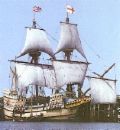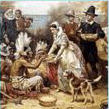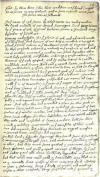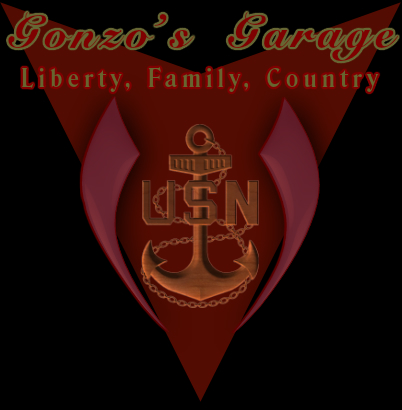














Other
Mayflower Related Documents:
This document is
also listed in

Basic Readings of
U.S. Democracy

Click the image
to
view the document |
It has been said
that the Mayflower Compact document was at least
partially the basis or inspiration for the
United States Constitution and other early
American documents. Had the Pilgrims
decided to go it alone, surely they would have
all soon perished. This document gave them
the vehicle by which to govern themselves and
instill a sense of order in their new land.
It is obvious from the wording of this document,
in my opinion, that their Christian Faith was of
utmost importance to them, and that they were
very much concerned with having a cohesive,
secure society amongst themselves as they
explored the new world. It is also
apparent from the document's wording that they
wanted to move to a more democratic form of self
governance, rather than remain subjects of the
King of England.
Some time after landing at Plymouth, the forty-one adult male passengers gathered in
the cabin of the Mayflower to decide what to do
next. With the help of William Brewster's book
of law, they formulated and signed the Mayflower
Compact which consolidated the passengers into a
"body politic" that had the power to enact laws
for the settlement. The compact also established
the rule of the majority, which remained a
primary principle of government in Plymouth
Colony until it became part of the Massachusetts
Bay Colony in 1691.
Mayflower Compact 1620
Agreement Between the
Settlers at New Plymouth : 1620
IN THE NAME OF GOD, AMEN. We, whose names are
underwritten, the Loyal Subjects of our dread
Sovereign Lord King James, by the Grace of God,
of Great Britain, France, and Ireland, King,
Defender of the Faith, etc.
Having undertaken for
the Glory of God, and Advancement of the
Christian Faith, and the Honour of our King and
Country, a Voyage to plant the first Colony in
the northern Parts of Virginia; Do by these
Presents, solemnly and mutually, in the Presence
of God and one another, covenant and combine
ourselves together into a civil Body Politick,
for our better Ordering and Preservation, and
Furtherance of the Ends aforesaid: And by Virtue
hereof do enact, constitute, and frame, such
just and equal Laws, Ordinances, Acts,
Constitutions, and Officers, from time to time,
as shall be thought most meet and convenient for
the general Good of the Colony; unto which we
promise all due Submission and Obedience.
IN WITNESS whereof we
have hereunto subscribed our names at Cape-Cod
the eleventh of November, in the Reign of our
Sovereign Lord King James, of England, France,
and Ireland, the eighteenth, and of Scotland the
fifty-fourth, Anno Domini; 1620.
The Mayflower Compact Signers:
Mr. John Carver
Mr. William Bradford
Mr Edward Winslow
Mr. William Brewster
Isaac Allerton
Myles Standish
John Alden
John Turner
Francis Eaton
James Chilton |
John Craxton
John Billington
Moses Fletcher
John Goodman
Mr. Samuel Fuller
Mr. Christopher Martin
Mr. William Mullins
Mr. William White
Mr. Richard Warren
John Howland
Mr. Stephen
Hopkins |
Degory Priest
Thomas Williams
Gilbert Winslow
Edmund Margesson
Peter Brown
Richard Britteridge
George Soule
Edward Tilly
John Tilly
Francis Cooke |
Thomas Rogers
Thomas Tinker
John Ridgdale
Edward Fuller
Richard Clark
Richard Gardiner
Mr. John Allerton
Thomas English
Edward Doten
Edward Liester |

Signing of the Mayflower Compact
More
information about this document can be found:
|

